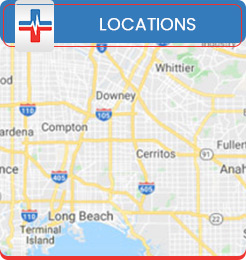Geriatric Care Clinic Q&A
As grow older, their bodies get weak and they become vulnerable to a variety of chronic illnesses. Thus, the focus of geriatric care is on the medical needs of senior citizens. If you are looking for high-quality geriatric care for a variety of common geriatric diseases. Dr. Usha Rani K. Reddy, M.D. is dedicated to providing geriatric medical care to continue live as independently as possible. For more information, contact us or schedule an appointment online. We have convenient locations to serve you in Bixby Knolls Long Beach, Downtown Long Beach, and Paramount, CA.


Table of Contents:
What is considered geriatric care and why is it important?
At what age should you start seeing a geriatric doctor?
What is the difference between a primary care doctor and a geriatric doctor?
What are the common elderly health problems?
Geriatric care focuses on the health of elderly individuals. This is an important field in healthcare because older adults often have multiple health conditions that can interconnect and require comprehensive care and management.
Physicians who specialize in geriatric care help their patients manage chronic illnesses, enhance mobility, and address cognitive and emotional health issues. This type of specialized care is essential, especially as our population is aging. Geriatric care not only helps older adults manage multiple chronic conditions and maintain independence but also supports their caregivers and loved ones.
There’s no set age for when you should start seeing a geriatric doctor; it comes down to your unique health needs. Many people begin considering geriatric care when they’re in their late 60s or 70s, especially if they’re dealing with multiple chronic conditions or their health issues become more complex.
Geriatricians are experts at navigating the various challenges that come with aging, and their care is incredibly valuable, especially as health needs typically increase with age. These physicians also focus on prevention and the thoughtful management of the daily issues that impact elderly patients’ quality of life.
If you notice that your daily activities are being restricted by health issues or if managing your healthcare is becoming too complicated, it is likely the right time to see a geriatrician. By seeking geriatric care proactively, you can maintain your independence and learn how to manage your health conditions successfully to stay well.
When deciding whether to see a primary care doctor or a geriatric doctor, understanding their specific roles is helpful. Primary care doctors are generalists who treat patients of all ages. They help patients address acute concerns, perform routine check-ups, and manage chronic diseases.
In contrast, geriatric doctors specialize in the healthcare needs of older adults. They have expertise in the complexities of aging, including managing multiple medications, the interplay of various chronic illnesses, and issues related to mobility and cognitive changes that often affect the elderly.
Whether you should visit a primary care doctor or a geriatrician depends on your age and the complexity of your healthcare needs. If you are an older adult who has been diagnosed with several chronic conditions or is experiencing other challenges related to getting older, seeing a geriatrician can be highly beneficial.
Common health issues that affect elderly patients include:
– Eye problems: As people get older, eye problems such as cataracts and glaucoma become more common. These conditions affect vision and can make daily tasks incredibly challenging to perform.
– Hearing loss: Many elderly patients have difficulties hearing or experience hearing loss, which significantly hinders their ability to communicate.
– Dementia: Dementia refers to progressive conditions, such as Alzheimer’s disease, that affect a patient’s cognitive abilities, including memory and reasoning.
– Mobility issues: Many older adults experience reduced mobility due to conditions like arthritis or osteoporosis. This can increase the risk of falls and require modifications in their living environment to ensure safety.
– Depression: In older adults, mental health can decline due to loneliness, medication side effects, and the stress of managing various conditions.
– Heart disease: Heart conditions, such as high blood pressure and heart failure, are more common in older patients. Managing these conditions requires lifestyle changes and medical supervision.
– Incontinence: Urinary and fecal incontinence can affect older patients, significantly impacting their quality of life. These conditions can occur due to medication side effects, weakened or overactive muscles, or nerve damage.
These are just some of the many health problems that affect older patients. While it’s normal to experience health challenges as you get older, you should never ignore your symptoms or skip regular check-ups with your doctor. Your doctor can assess your concerns as well as guide you on how to modify your lifestyle to minimize the risks of age-related health issues. For more information, contact us or schedule an appointment online. We have convenient locations to serve you. We serve patients from Downtown Long Beach CA, Los Altos CA, Paramount CA, Bixby Knolls Long Beach CA, East Side CA, and surrounding areas.
Check Out Our 5 Star Reviews






